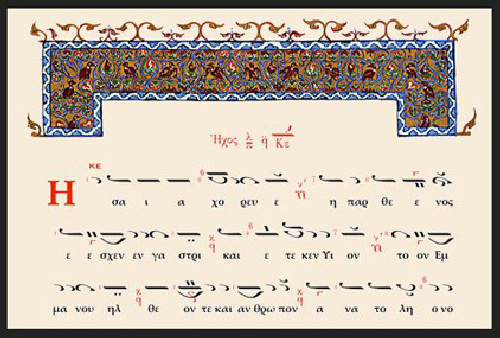
We often see on the walls inside Orthodox churches the iconography depicting the heavenly Liturgy of the Angels, that also includes elements of the Divine Liturgy which we humans celebrate in our holy churches. As we talked about in our previous Homily, the Angels and humanity are united in worshipping the Lord of Heaven and Earth. Just as the holy Angels endlessly praise and offer glory to the Triune God around the Throne of the Almighty, we also gather before the earthly Throne of God (the Holy Table or Altar). We offer the established Prayers (along with our supplications), and when celebrating the Sacrament of the Holy Eucharist (as in other holy Services as well), we are chanting thanksgiving and glorification hymns to the Triune God.
This is also what the Lord did, at the end of the Last and Mystical Supper that He had with His disciples. As St. Matthew the Evangelist writes: “And when they had sung a hymn (the traditional hymns of Passover), they went out to the Mount of Olives” (Matthew 26:30). The Apostles continued this practice at the sacred gatherings where they were celebrating the holy Eucharist. This is the Tradition that became universal in the Church. That is why the Prayers and Supplications that comprise the Divine Liturgy are connected with the hymns that the laity sing. We not only exemplify the work of the Angels by doing this, but we also help ourselves in calming the soul, feeling compunction, and raising our hearts spiritually towards Heaven.
The Holy Fathers of our Church have exalted the beneficial influence that the chanting of Church hymns has on the hearts of the faithful. Let us offer the testimony of only three of them, in free translation. St. Basil the Great writes: “Chanting brings calmness to the soul, and establishes the dominance of peace…It takes away sorrow and offers comfort and joy.” According to St. Athanasius the Great, “by chanting, any trepidation, disorder and hardness of the heart is settled; and any wound caused by sorrow is healed.” And finally, St. John Chrysostom declares that “with Chanting, even the air becomes holy.”
However, we must make it clear that, as the Synodical Canons of the Church decree, Chanting is not there in order to please the hearing of the faithful, as it is in a concert. As St. John Chrysostom also says, “the Church is not a theater so that we may hear something for pleasure.” It is also not a showcase for the chanter, to display their vocal and musical talents. The purpose of Chanting is not to merely stir the emotions, but to bring the soul to true repentance, sobriety, spiritual watchfulness and vigilance. It lifts up our prayer, urging us to a fuller devotion and love for God. Through Chant, we can powerfully express our gratitude and doxology to God. At the same time, Church music also makes the word of God more accessible in a melodic way, so that the meaning becomes clearer. After all, a big portion of the hymns are composed from passages of the Holy Scriptures (especially the Psalms).
It is for this reason that the Church exhorts the chanters to chant in such a way that the congregation can understand the words of the hymns, and participate in the common worship. The hymns are always a Prayer, and teach us with an intonated word. If we pay attention to the words of the hymns that we sing throughout the year in our churches, we realize that they contain the whole dogmatic and ethical teachings of the Church (as well as the main events of the life of our Lord, the Theotokos, Holy Apostles and the Saints whom we honor every day). This all becomes clear when we consider that in earlier times, there were Monks who had never studied theology (some of them barely knew how to read and write), and yet they were able to accumulate an excellent amount of theological knowledge through their regular attendance at the Holy Services (combined with their personal sanctity and asceticism).
Because we chant in our liturgical gatherings in order to pray (rather than for a concert), the Orthodox Church has not made use of musical instruments. With the harmonium (organ), for example, we have a nice technical performance which we enjoy, but such a thing leads us away from the realm of prayer. The vocal Orthodox music in the Divine Liturgy coordinates, in some way, the steps of our soul in the path of prayer in order to reach the highest point of the celebration (the Sacred Mystery of the Eucharist). So that we can, with faith and passion, approach the Holy Chalice “and become sharers of life eternal” (as we sing in the Liturgy of the Pre-sanctified Gifts instead of the Cherubic Hymn).
My dear brothers and sisters, the singing of hymns in our Church is for us a precious spiritual heritage. It is the fruit of great poets and hymnographers who arose throughout the life of the Church, and is an invaluable artistic inheritance. It is for this reason that it remains living to this day, inspiring, sanctifying and giving life to the faithful. But in order for us to allow the words and teachings of the hymns to touch our hearts, a special effort and increased attention is required from each of us. Such an effort is worth it, as the spiritual benefits are valuable. It is like discovering a hidden treasure. Amen.





